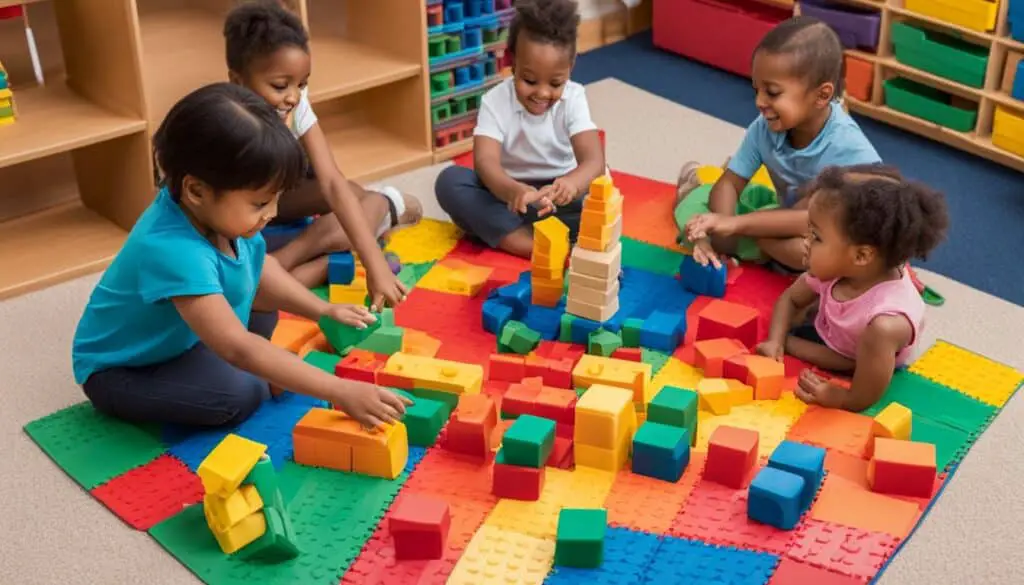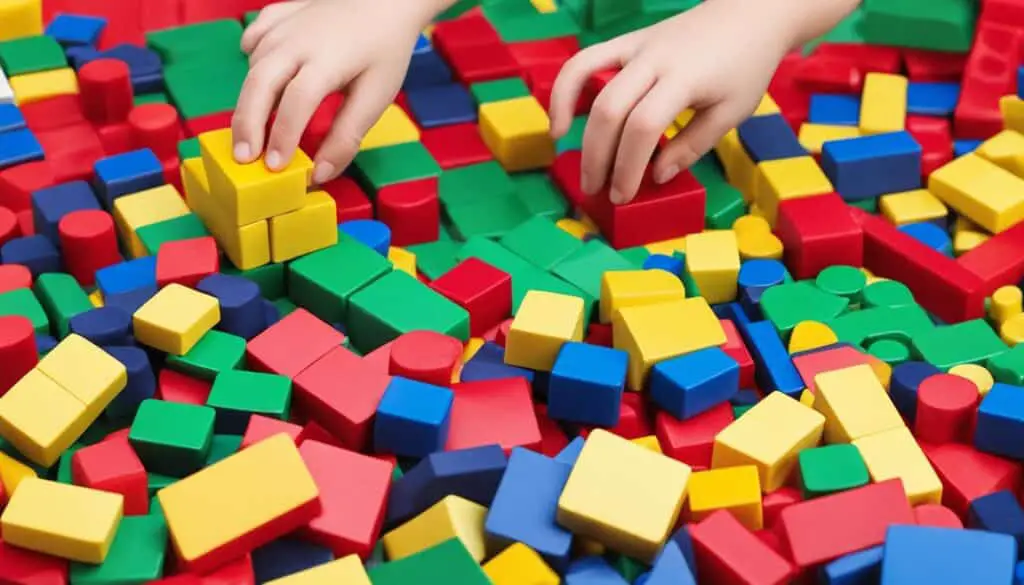Supporting Early Math Skills in Children
As a copywriting journalist, I know that supporting math skills in early childhood is crucial for building a strong foundation for future math success. Early math skills lay the groundwork for more advanced mathematical concepts and logical thinking.
According to research, children who have a solid foundation in math during their early years continue to perform well in math throughout their educational journey. Furthermore, early childhood is an optimal time to introduce children to mathematical concepts as it is a time when they are naturally curious and eager to learn.
In this section, we will explore the importance of supporting math skills in early childhood and discuss effective strategies to foster a strong mathematical foundation.
Key Takeaways
- Supporting math skills in early childhood sets the foundation for future math success.
- Early childhood is a critical time for introducing children to mathematical concepts.
- A strong mathematical foundation helps children develop logical thinking skills.
- Research shows that children who have a strong foundation in math during early childhood continue to perform well in math throughout their academic journey.
- Effective strategies for supporting early math skills include creating a math-rich environment, incorporating play-based learning, and utilizing manipulatives and games.
Creating a Math-Rich Environment
To support early childhood math skills, it is essential to establish a math-rich environment that encourages young children to explore, experiment and engage with mathematical concepts in their everyday life.
Creating a math-rich environment is not about introducing formal math concepts to your child, but rather about providing access to math in everyday experiences. Use everyday opportunities to support numerical awareness and mathematical thinking, such as asking your child to count out the number of apples they want at the grocery store, or discussing spatial relationships during a trip to the park.
Here are some additional ideas for creating a math-rich environment in your home or classroom:
- Provide a variety of math-related toys such as counters, pattern blocks, and shape sorters.
- Include math-related books in your child’s library that support early numeracy skills.
- Set up an area for building structures with blocks and other materials to encourage problem-solving and spatial reasoning.
- Display math-related posters and charts around your learning space to reinforce math concepts.
By creating a math-rich environment, children will naturally engage with math and develop a positive attitude towards mathematics from an early age. This sets the stage for them to continue building their math skills throughout their lives.
Incorporating Play-Based Learning
Play-based learning offers an effective and enjoyable approach to developing early math skills in children. Through play, young children can learn to recognize different shapes, sizes, and patterns, as well as develop foundational concepts in geometry, counting, and operations.
Moreover, play-based activities provide opportunities for children to practice problem-solving, critical thinking, and decision-making skills. By experimenting with different strategies and approaches to solving challenges, children develop a mindset that encourages creativity and innovation, which are vital skills in the 21st century.

Examples of play-based activities that promote early math skills development include:
- Building with blocks
- Playing with shape-sorter toys
- Exploring geometric shapes through puzzles and tangrams
- Counting objects during pretend play activities
These activities not only engage children in active learning but also help them develop a positive attitude towards math. By keeping the learning experience fun and enjoyable, children are more likely to develop a lifelong love of learning, which can benefit them in their academic and personal lives.
The Benefits of Play-Based Learning:
“Play is the highest form of research.”
– Albert Einstein
Play-based learning has been shown to have numerous benefits for young children, including:
- Increased engagement and motivation to learn
- Improved problem-solving and critical thinking skills
- Development of social and emotional skills
- Enhanced creativity and innovation
- Strengthened self-regulation and attentional skills
By incorporating play-based learning into daily routines, parents and educators can help children develop a strong foundation in math and set them up for success in their future academic and personal pursuits.
Utilizing Manipulatives and Games
Mathematics can be a challenging subject for children, but incorporating manipulatives and games in their learning activities can make it a fun and engaging experience. Manipulatives are concrete objects that children can touch, such as blocks, balls, or shapes, to help them understand mathematical concepts. Similarly, math games offer a playful way to introduce and reinforce math skills, such as counting, addition, and subtraction.
Manipulatives and games provide hands-on learning experiences that can enhance children’s spatial reasoning, problem-solving, and critical thinking skills. By engaging children in meaningful math experiences, they can strengthen their understanding of mathematical concepts and improve their ability to solve math problems.
Types of Manipulatives
There are many types of manipulatives that parents and educators can use to support children’s math skills. Here are some examples:
| Manipulative | Usage |
|---|---|
| Cuisenaire Rods | Teaching number properties, measurement, fractions, and patterns. |
| Geoboards | Teaching basic shapes, symmetry, area, and perimeter. |
| Pegboards | Teaching counting, patterning, and simple addition and subtraction. |
These are just a few examples of the many manipulatives available to parents and educators. By providing children with hands-on experiences using these tools, they can develop a deeper understanding of mathematical concepts.
Math Games
Math games can also be a valuable tool for enhancing children’s math skills. Here are some examples of math games:
- Sum Swamp – teaches addition and subtraction while navigating through obstacles.
- Yahtzee – teaches probability, addition, and multiplication through rolling dice.
- Sequence Numbers – teaches place value and sequencing through a card game.
These games offer a fun and engaging way for children to practice math skills in a low-pressure environment.

Incorporating manipulatives and math games into children’s learning environments can greatly contribute to their understanding and enjoyment of mathematics. Hands-on learning experiences can help children build a strong mathematical foundation that can benefit them throughout their lives.
Conclusion
In conclusion, as a journalist and someone who understands the importance of early childhood education, I recommend supporting math skills in children from a young age. By creating a math-rich environment, incorporating play-based learning, and utilizing manipulatives and games, parents and educators can help children develop a foundation for mathematical thinking that will benefit them throughout their lives.
Mathematics is an essential subject that spans across various life domains, and by fostering a love for math in early childhood, we are setting our children up for success in their future academic and professional careers. It is important to note that mathematics can be an intimidating subject for many children. Parents and educators must approach math education with patience, positivity, and creativity, providing children with a safe and supportive environment to learn and grow.
In conclusion, supporting math skills in early childhood is an investment in our children’s future. By utilizing the strategies mentioned in this article, we can help children develop the skills and confidence needed to excel in mathematics and become problem-solvers and critical thinkers. As someone who is passionate about early childhood education, I encourage parents and educators to prioritize early math skills development and help our children reach their full potential.
FAQ
Why is it important to support math skills in early childhood?
Supporting math skills in early childhood is crucial because it lays the foundation for future math learning. Research shows that children who have a strong mathematical foundation in their early years are more likely to succeed in math later on in school.
How can I create a math-rich environment for my child?
Creating a math-rich environment involves incorporating math concepts into everyday activities. You can provide children with math-related books, puzzles, and games. In addition, you can encourage them to count objects, measure ingredients during cooking, and identify shapes and patterns in their surroundings.
How does play-based learning promote math skills?
Play-based learning allows children to explore mathematical concepts in a hands-on and interactive way. Through play, children can develop their problem-solving skills, critical thinking abilities, and mathematical reasoning. Activities like building with blocks, playing with puzzles, and engaging in pretend play all contribute to the development of math skills.
What are manipulatives and how do they support math skills?
Manipulatives are objects that children can manipulate and use to understand math concepts. They can be anything from blocks and shapes to counting cubes and pattern blocks. Manipulatives provide a hands-on approach to learning math and help children visualize and comprehend abstract mathematical ideas.
What are some math games that can help enhance math skills?
There are many math games that can be used to enhance math skills in early childhood. Some examples include number and counting games, shape recognition games, and measurement games. These games make learning math enjoyable and engaging for children.




